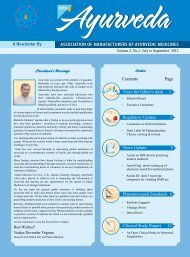ishing You Happy New Year - amam-ayurveda.org
ishing You Happy New Year - amam-ayurveda.org
ishing You Happy New Year - amam-ayurveda.org
Create successful ePaper yourself
Turn your PDF publications into a flip-book with our unique Google optimized e-Paper software.
Indian cos see red over<br />
laldant manjan patent<br />
ARINDAM<br />
Ayurvedic Body Slams Colgate For patenting Indian Traditional Knowledge<br />
Sagar Malviya & Maulik Vyas<br />
MUMBAI<br />
Lal dant manjan may make many Indian<br />
remember the old Dabur commercial<br />
featuring a schoolbay named Raju and<br />
his Masterji, Bur Lal dant manjan, or red herbal<br />
dentifrice, is now patented in the US by Colgate<br />
Palmolive, and Indian ayurvedic companies have<br />
sought government intervention to cancel it.<br />
The Association of Manufacturers of Ayurvedic<br />
Medicines (AMAM), which represents 200<br />
companies, including Dabur, Himmalaya, Hamdard<br />
and Baidyanath, has accused the American personal<br />
care giant of patenting an Indian traditional<br />
knowledge in the US, India and elsewhere.<br />
It has urged the patent authority, the health ministry<br />
as well as the industrial ministry to take immediate<br />
measures to stop patenting of this traditional product<br />
and “initiate action not only in the US but also in<br />
other countries where Colgate Palmolive might<br />
have applied for the patent”.<br />
Colgate received patent for red herbal dentifrice in<br />
the United States in June this year on the basis of an<br />
application dated 2005, filed in India.<br />
The company did not respond to an email query.<br />
“Colgate has used its clout to obtain patent in the<br />
drawal the US. But the Indian government should<br />
seek with drawal the US patent and cancel the<br />
Indian application too as the product is a traditional<br />
herbal medicine discovered in India, “said Pradeep<br />
Multani, general secretary ot the association.<br />
The controller General of Patents, which grants<br />
patents in India, has yet to decide on Colgate’s<br />
application. “In the US, getting patents is far more<br />
simple compared to India, “said Abhishek Khare,<br />
partner at Khare Legal Chambers.<br />
In India, a patent is granted post-grant objections,”<br />
said Mr Khare.<br />
In fact, the US and the European Union have<br />
conclled patents on tunneric and neem following<br />
opposition form India. In 1995, the US granted a<br />
patent for turmeric to two non-resident Indians<br />
associated with the University of Mississipi Medical<br />
Centre, Jackson, USA. <strong>New</strong> Delhi based Council<br />
for Agriculture Reserch challenged the patent on<br />
the ground that it lacked novelty and the US Patent<br />
Office up-held the objection and cancelled the<br />
patent.<br />
Similarly, the European Patent Office awarded a<br />
patent for Neem to the United States Department of<br />
Agriculture and chemical multinational WR Grace<br />
in 1995. This parent was withdrawn in 2005 due to<br />
severe opposition from various parties in India.<br />
In its patent application for lal dant manjan,<br />
Colgete included several medicinal plants such as<br />
piper nigrum, piper longum, camphor, tomar seed,<br />
tenninalla chebula, clove, cinnamon, vajradanti<br />
among other herbs in the patent.<br />
Amam has challenged this in its letter to the<br />
Indian health ministry, the Controller General ot<br />
Patents and the Department of Industrial Policy<br />
& Promotion, which is responsible for policies on<br />
intellectual property rights, patents and trademarks.<br />
“Several companies like Dabur and Baidyanath<br />
have been marketing this product since decades in<br />
India, “it said in the letter.<br />
Dabur India, which has been selling Dabur Lal Dant<br />
Manjan since 1970, declined to comment, but some<br />
people close to the company said it is exploring<br />
legal actions against Colgate.<br />
Colgate Palmolive, which controls half the oral<br />
care segment worth Rs. 2,800 crore in India, is<br />
synonymous with toothpaste in India. Of late, it has<br />
been gradually pushing more affordable products<br />
such as toothpowder to penetrate into rural areas<br />
and reach out to a larger sonsumer base.<br />
While the oral care category is growing be around<br />
8-10%, the toothpowder segment worth Rs. 500<br />
crore offers huge potential as rural India, which<br />
houses 70% of Indian population, joins the India<br />
growth Penetration of modern oral care products is<br />
very low and many people in rural India still clean<br />
their teeth and many people in rural India still clean<br />
their teeth with traditional products like twige of the<br />
neem tree, salt, ash and other herbal items.<br />
That’s precisely the opportunity that Colgate seeks<br />
to tap in a market where it still share the top spot<br />
with rival Dabur, both having 30% share in the<br />
hinterland. “If Colgate manages to get the patent,<br />
it will have an added advantage to expand in this<br />
category,” said Anand Raghuraman, partner and<br />
director at Boston Consulting Group.<br />
Courtsey: Economic Times<br />
Dated: 20/10/2010; Wednesday<br />
www.<strong>amam</strong>-<strong>ayurveda</strong>.<strong>org</strong> 6


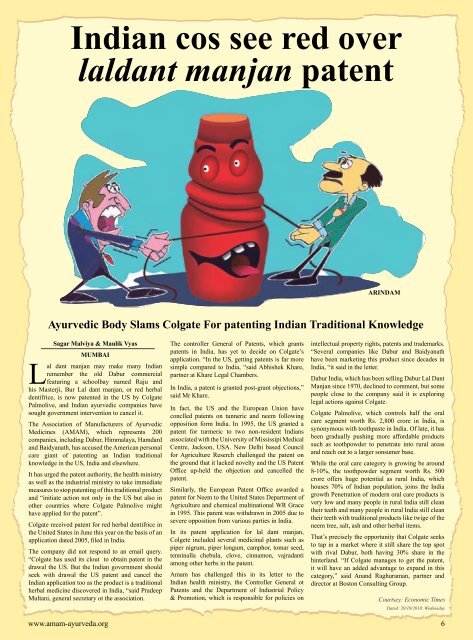

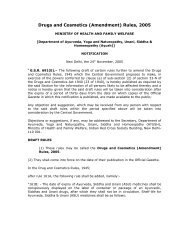
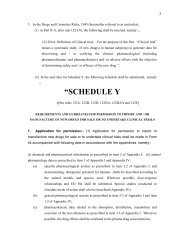
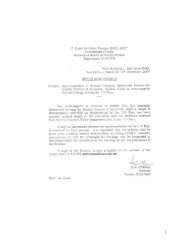
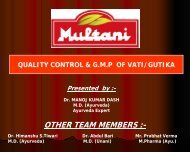


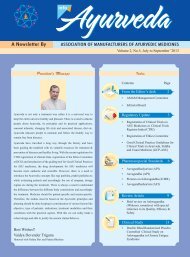
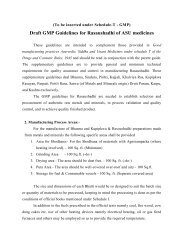

![[To be published in Gazette of India Part II Section 3, sub-section iii]](https://img.yumpu.com/28570283/1/190x245/to-be-published-in-gazette-of-india-part-ii-section-3-sub-section-iii.jpg?quality=85)

